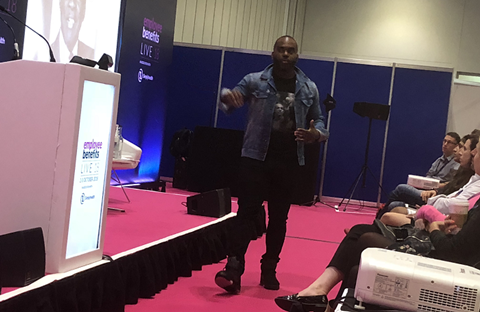
Employee Benefits Live 2018: Employers must stop looking for a quick solution, and instead work on breaking conventions to truly celebrate and promote diversity and inclusion in the workplace.
In the opening keynote address on day two of Employee Benefits Live, entitled ‘Breaking with convention’, Damien Hooper-Campbell, vice president and the first chief diversity officer at e-commerce organisation eBay, described his work promoting diversity and inclusion, and spoke of how employers can take their own steps.
Hooper-Campbell noted that most organisations follow similar patterns when trying to face down negative headlines surrounding diversity. These include spending money on the problem, increasing training, or saying nothing through a fear of offending.
On the subject of the increasing amount of training on the subject of unconscious bias and diversity, Hooper-Campbell said: “So many times we spend so much money on these programmes and getting these experts to come in and show us all this data, and we forget that we’re human beings.”
Instead, Hooper-Campbell urged organisations to do something different and to make an effort to break convention. To demonstrate, he asked delegates to speak about convention-breakers in their own lives. This, he stated, was an example of an integral first step that many organisations overlook.
“The number one thing that you should be doing at all of your organisations before you do anything else around diversity is to start with a conversation,” he explained. “A very human and a very vulnerable conversation, unlike the ones we typically have inside organisations.
“We all just shared examples of people who bucked the status quo, who’ve been brave, who have had guts, who got up and moved when it was unpopular, who taught a different way. This isn’t a programme inside of [an organisation], it’s real human beings demonstrating the same level of courage, the same level of convention breaking that we all need to have.”
Hooper-Campbell went on to illustrate how this attitude to having real conversations and breaking with conventions around diversity worked practically.
At eBay, workplace diversity fits into three main categories: focusing on how the organisation hires, not just who it hires; making sure the environment is enjoyable for employees; and including buyers, sellers and communities in its efforts.
For example, when Hooper-Campbell came into his role, eBay was making efforts to reach out to female and minority candidates. However, it was not targeting women’s universities, or those predominantly attended by ethnic minorities. The decision to do so, he argued, was evidence of the importance of giving ownership of the talent pipeline to the diversity director.
Last month, eBay launched its Courageous Conversations programme, which allows for safe, if not necessarily comfortable, dialogue between employees with different beliefs, backgrounds or lifestyles, and allowing individuals to ask questions they might otherwise be uncomfortable raising.
“This is the new frontier,” he said. “This is work 2.0. This is the future of work: running towards these conversations and not acting like we’re not human beings inside of these [organisations]. This is bringing our population together and it’s something that we’re very proud of.”
When it comes to including the wider marketplace, Hooper-Campbell mentioned eBay’s work auctioning off some of the outfits worn at the Golden Globes during the Time’s Up campaign, raising money for the Time’s Up legal defense fund.
“[This is] something that aligns with our business model, breaks with convention, which is what many women did in the #MeToo conversation, and also helps to drive our brand,” he explained.
The organisation has also done work with an African American artist, celebrating ethnicity and International Women’s Day, selling more than 300 prints in fewer than 60 minutes. “If anybody tells you that diversity doesn’t mean business, this is an example of how it definitely does,” Hooper-Campbell remarked.
Hooper-Campbell noted that it is important for organisations to consider the holistic nature of inclusion, and the fact that there are many categories for diversity that go beyond those that employers traditionally consider. Furthermore, they should not underestimate the power of bringing those in the majority into the discussion.
When approaching diversity and inclusion, Hooper-Campbell stated that employers must ask themselves some key questions. Some of the topics he suggests delving into include: whether the chief executive officer, and any other individual involved, truly cares about diversity; whether the work and values of the organisation are aligned with diversity and inclusion; whether the teams promoting diversity are diverse themselves; and whether those involved have enough proximity and interaction with the groups they are advocating for.
“Proactively seek out engagement and understanding, and be vulnerable, be proximate enough,” he stated. “Are you a convention keeper, or a convention breaker? That should be guiding every single thing that you do.”
Finally, Hooper-Campbell urged delegates to remember that these processes take time, and that there is no quick fix, one-size-fits-all solution that will allow them to solve the issues around diversity, but that they still have enormous influence, and can make important progress.
“Don’t put the burden of trying to solve this on yourselves,” he explained. “It’s taken years for us to get to this place, it will not be solved by an app or a two-hour training session, or even by you alone. When it gets tough in the advocacy work that you do, remember the people who came before you, and also remember the people who are looking up to you, and who are waiting for you to be brave and break convention.”











